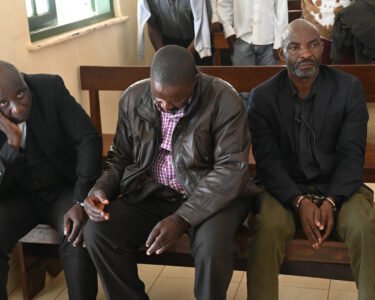As Uganda prepares to mark World Elder Abuse Awareness Day (WEAAD) on Friday, June 20, 2025, the State Minister for the Elderly, Dominic Gidudu Mafabi, has made an urgent call for stronger measures to protect older persons from increasing levels of abuse and neglect.
Addressing journalists in Kampala, Minister Mafabi decried the alarming rates of mistreatment faced by Uganda’s elderly, noting that abuse in the form of physical violence, psychological torture, financial exploitation, and social neglect has become a daily reality for many.
Latest
Security Guard Turns Gun on Colleagues, Kills Two on Spot
Minister Hellen Adoa Defends FPU, Pledges Reforms to Protect Fishermen and Lakes
No Casualties Reported in Kitezi Landfill Fire – Police
Police Arrest One in Kawempe Robbery, Manhunt Launched for Accomplice
Hon. Magyezi Unveils UGX 667M Milk Facility to Boost Dairy Value Chain
FDC Opens Nominations for MPs and LC5 Chairpersons
21-year-old Arrested in Semuto For Theft of Electricity Cables
Opposition MPs Slam UPDF Act, Say It Serves Museveni’s Interests
“Elder abuse is not just a violation of rights; it is a threat to our collective dignity,” Mafabi warned. “We must act urgently and in a coordinated manner to end this hidden crisis that affects thousands of older persons across the country.”
Uganda’s national observance of WEAAD was rescheduled from June 15 to June 20 due to ongoing elections for older persons’ representatives. The commemorative event will take place at Kampala Capital City Authority (KCCA) grounds under the global theme “Strengthening Coordination to End Elder Abuse.”
Citing findings from the Uganda Bureau of Statistics (UBOS) 2021 report, Mafabi revealed that 84% of elder abuse—especially targeting women—takes place within the home. Relatives, including the victims’ own children, are the main perpetrators. The report also found that 38% of older women were abused at least once in a year, while 30% experienced abuse three to five times during the same period.
“These statistics are chilling,” Mafabi said. “The majority of our older citizens are suffering in silence, and yet many are being hurt by those they trust the most.”
According to the 2024 national census, Uganda’s elderly population now stands at over 2.3 million, accounting for 5% of the country’s total population. Mafabi warned that without urgent interventions, this growing demographic could become increasingly vulnerable.
He called on government agencies, civil society organizations, local leaders, and community members to priorities the protection and inclusion of older persons in national development.
To strengthen the policy and legal framework, Mafabi outlined several key initiatives already underway. These include the revised National Policy for Older Persons, the National Social Protection Policy, and the operationalization of the National Council for Older Persons Act (2013). Uganda has also ratified the African Protocol on Human and Peoples’ Rights on the Rights of Older Persons.
Read Also
Anita Among’s Rival Thrown Out, Declared Unopposed for Bukedea Woman MP Seat
Namayanja Rallies Women to Lead in Nation-Building
Uganda Law Society Vows Court Action Against UPDF Amendment Act
Museveni Signs UPDF Amendment Law
MP Okot Bitek Denies Defection to NRM, Reaffirms Loyalty to Opposition
Judicial Inertia Keeping Me from Home – Ssemakadde
In addition, the government has rolled out the Social Assistance Grant for Empowerment (SAGE) for those aged 80 and above, and the Social Enterprise Grant for Older Persons (SEGO), which supports income-generating activities for those aged 60 to 79.
“While we have made some progress, the challenge remains huge. Elder abuse must be treated as a national emergency. We need tighter laws, increased public awareness, and more funding to strengthen social protection systems,” the Minister stressed.
Mafabi also urged the media to take an active role in educating the public about the rights of older persons and breaking down negative cultural stereotypes that fuel abuse, such as the widespread accusation of witchcraft, especially against older women.
“We must all remember—how we treat our elderly today is a reflection of the society we’re building for ourselves tomorrow,” he said.
National celebrations on June 20 are expected to attract government officials, development partners, civil society actors, and older persons themselves under the banner of solidarity and action.





